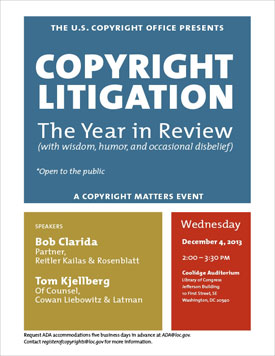
The Copyright Office is hosting an excellent, *free* Copyright Year in Review program on December 4 at 2 p.m. It is open to the public – and did I mention it’s *free*? The panelists are the always knowledeable and witty Bob Clarida and Tom Kjellberg. Bob and Tom have been killing it at the annual Copyright Society meetings for well over a decade (as long as I’ve been in attendance) and their presentation is always a highlight of the meeting. This program is definitely worth your while if you’re going to be in DC on the 4th and would like to brush up on recent copyright developments. Alas, the rest of us will have to wait until next June at the Copyright Society Annual Meeting. Sign up now, thank me later! https://www.copyright.gov/copyrightmatters/copy_litigation.html
 My esteemed partner, Lawrence Siskind, will be delivering his annual talk, “Nuts and Bolts of Trademark Law,” at the San Francisco Bar Association on July 12, 2012 from 12:00 – 1:30 p.m. It doesn’t get any more fun than this! I’ve attended before, and the program is both entertaining and informative.
My esteemed partner, Lawrence Siskind, will be delivering his annual talk, “Nuts and Bolts of Trademark Law,” at the San Francisco Bar Association on July 12, 2012 from 12:00 – 1:30 p.m. It doesn’t get any more fun than this! I’ve attended before, and the program is both entertaining and informative.